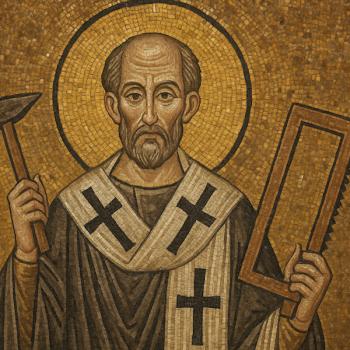Following the recent untimely death of Marvin Meyer, I have been thinking of a dear friend who was his close contemporary, and who died at an even earlier age. This was Bill Petersen, who taught New Testament and Early Christianity at Penn State until his death in 2006, at age 56, and who was probably the greatest scholar I have ever known personally in any discipline. He also believed firmly that his particular academic area – New Testament and Early Church – was on a path to ruin.
Bill was a dazzling figure – brilliant, gutsy, wildly generous, and with a wicked wit. His proposed book on Early Jewish Christianity would have been an epoch-making piece of scholarship on the early church, and one that can now never be written.
He operated under ferociously high scholarly standards. To say that he did not suffer fools in the academic world lightly is a gross understatement, rather like asserting that al-Qaeda harbors a mild distaste for the state of Israel. For Bill, studying Early Christianity demanded total familiarity with the essential languages – at a minimum, Greek, Syriac and Latin, plus all the learned tongues of modern Europe. It also meant deploying all the tools of critical scholarship, including understanding the precise means by which texts were transmitted over time. When he published his great book on the Diatessaron, the publisher, Brill, threw up their hands at finding proof-readers who could tackle the sixteen languages and various scripts involved: you’re on your own, they told him.
Bill often stated his near-apocalyptic view that this was the last academic generation that really could mobilize those intellectual resources, and that the future would be faddish, shallow and sensationalist. Don’t for a moment imagine a crusty reactionary. Politically and socially, he was highly progressive, and he was entirely open to post-modern and theoretical academic methods, so long as they were rooted in linguistic and critical expertise. But that expertise was becoming very rare. He genuinely felt that American (and European) institutions simply did not offer the kind of rigorous training that he himself had known at Utrecht, and that once those skills were gone, they were all but impossible to rebuild.
We can debate the roots of this trend. Partly, it’s the decline of the Classics in intellectual life. Only a century ago, a scholar would make a Greek or Syriac text easily available to a wider educated audience by translating it into Latin. There’s also the more general decline in rigorous language teaching in schools and universities. Academic over-specialization plays its part. Perhaps, said Bill, linguists don’t think they have time to master cutting-edge historical work or textual scholarship – but they did so in the past, and they must do so in the modern age.
To adapt a famous saying, he witnessed the old order changing, yielding place to – nothing much. He became incandescent on the subject of senior academics applying contemporary cultural approaches to the New Testament (say) without that essential scholarly foundation. He had a battery of stories about celebrated Early Christianity Professors X or Y whose conversation revealed screaming ignorance of basic historical background, or embarrassing linguistic gaps. Barbarism loomed.
Before you protest, I should add that I think his view was too pessimistic. I can easily point to plenty of up-and-coming younger scholars who would more than fulfill Bill’s exacting criteria, some with a range of languages that would have impressed Athanasius Kircher. But Bill did have valid points about shifting expectations within the academy, and within the wider culture.
You get some idea of Bill’s ideal scholars from some of the great names he venerated, figures who at the turn of the previous century published magnificent translations and critical commentaries on newly discovered ancient Christian texts. Most of those leaders and pioneers were German or Dutch, but he also venerated an elite corps of British scholars. J. Rendel Harris was one outstanding name, whose writings over several decades are eminently worth tracking down as models of their kind. Kirsopp Lake was another stalwart.
Another personal enthusiasm that Bill and I shared was Montague Rhodes James (1862-1936), who is best known today for his terrifying ghost stories, some of the finest in the English language. When though he was not terrifying readers, he pursued an impressive scholarly and antiquarian career. Among other things, His 1924 book on The Apocryphal New Testament was for many years the standard work on the subject in English – it also makes nonsense of the idea that the modern rediscovery of Gnosticism had to wait for the Nag Hammadi document finds of the 1940s.
To see the wide-ranging genius of the scholars of this age, their breadth of cultural and historical reference, you might for instance access one of James’s books, The Wanderings and Homes of Manuscripts (1919), which can be downloaded full text. Read it with awe, not least for the fact that it is written without a hint of jargon or academese. Bill called it “a real gem.”
Responding to such researchers, Bill’s response was “We shall not look upon their like again.” He meant it wistfully, and literally. We really wouldn’t.















